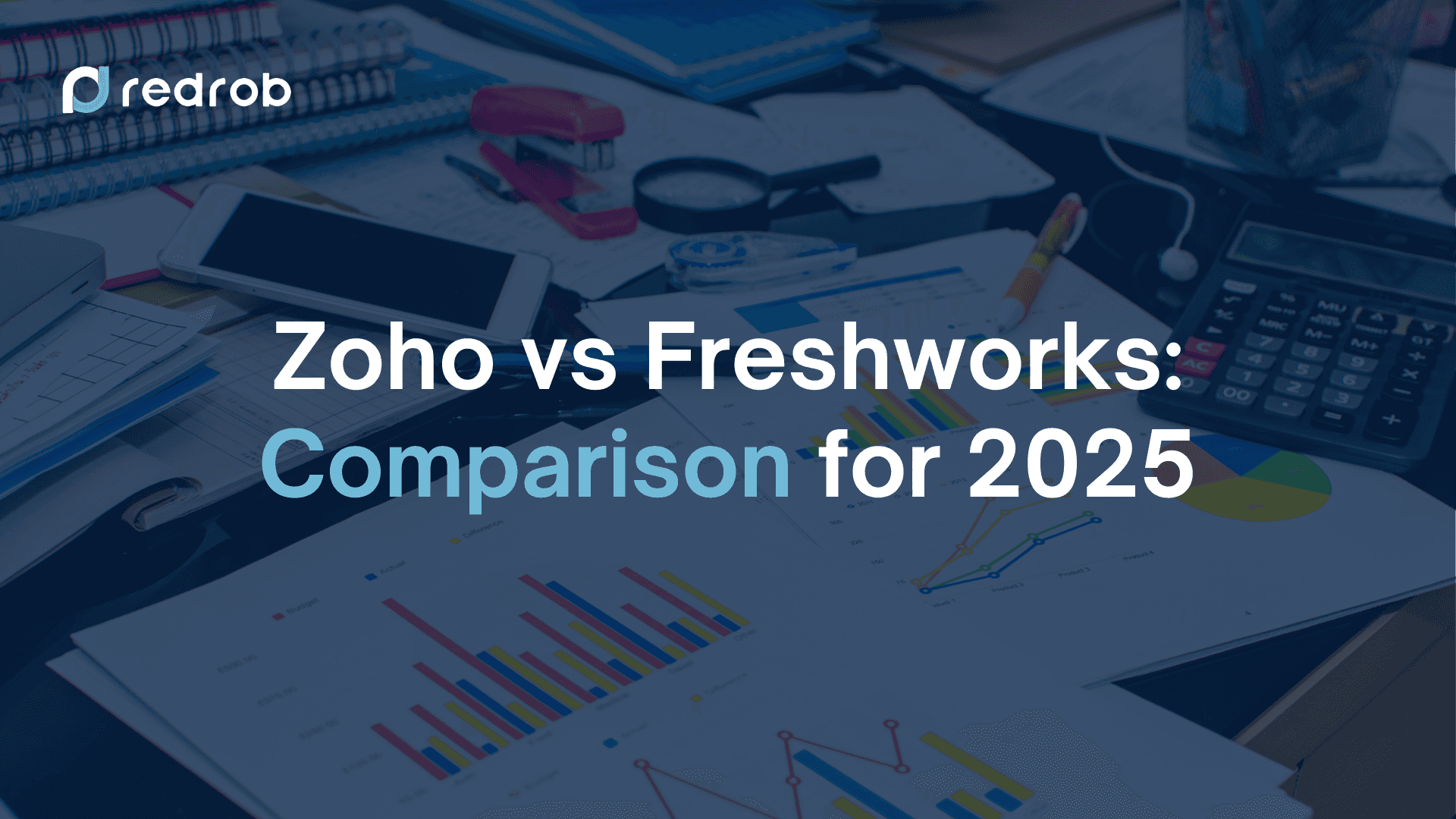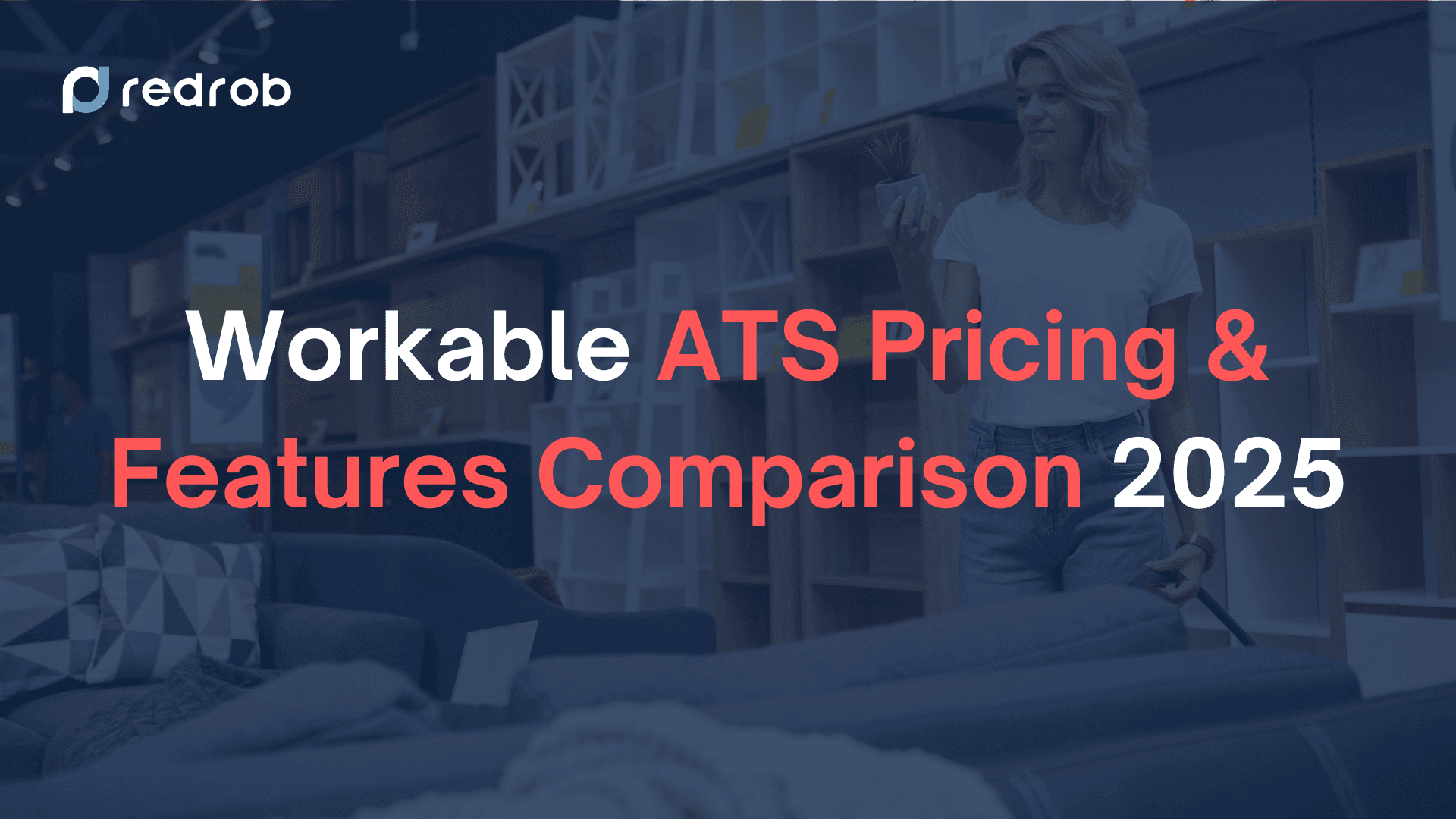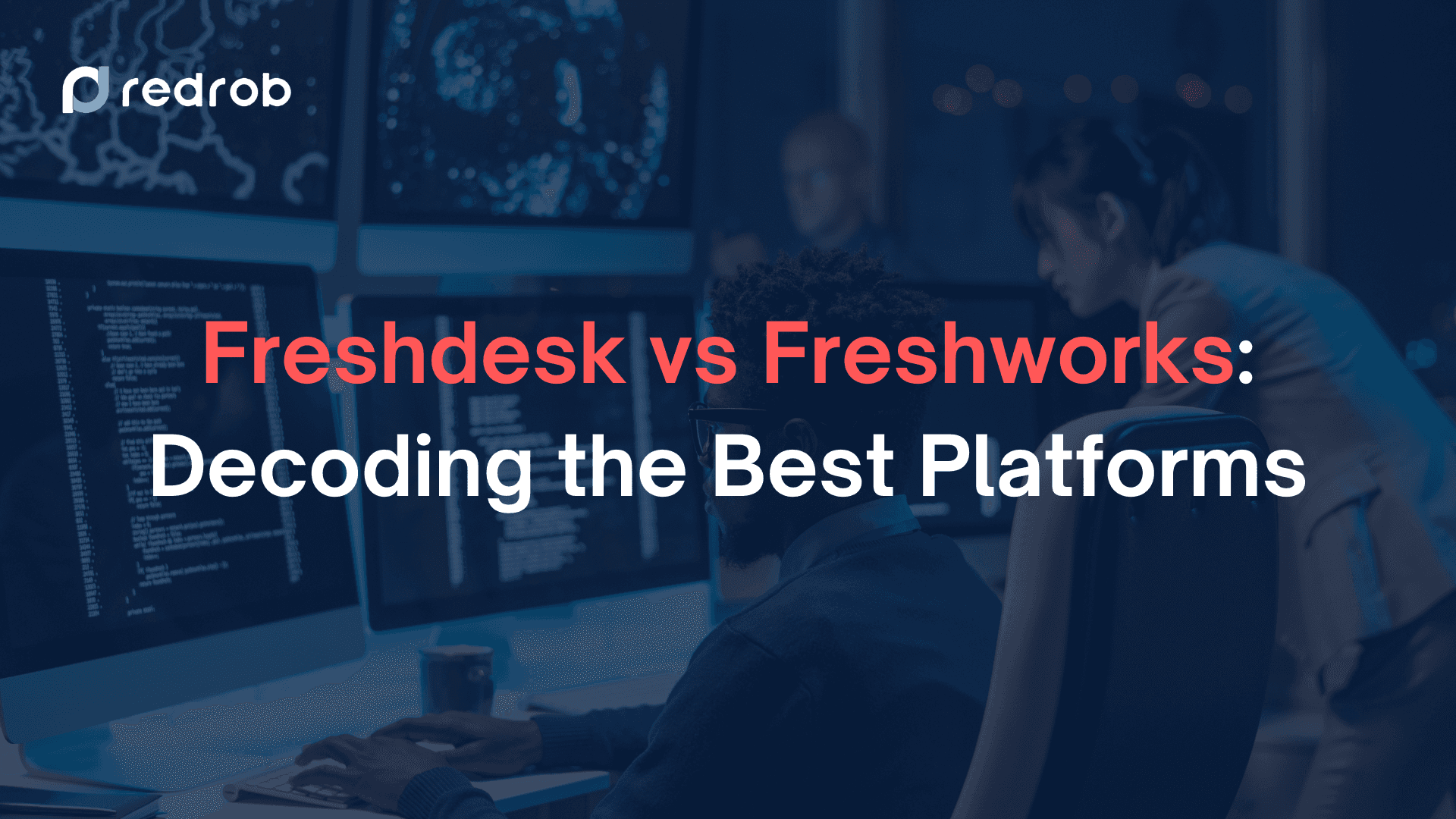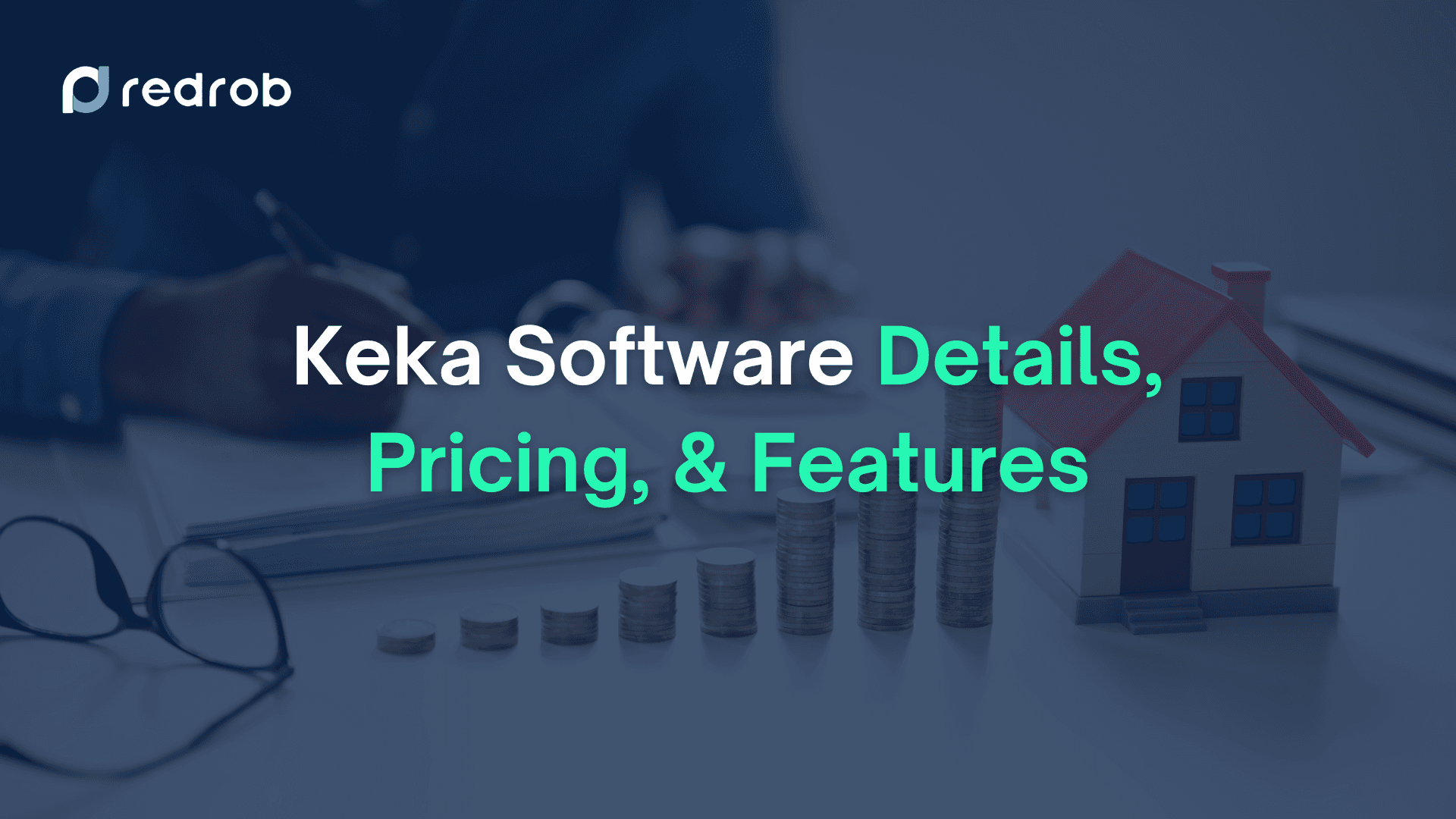Zoho vs Freshworks
7 mins read
•
Dec 26, 2024

Soumyata Singh
Your business deserves tools that don’t just work but work for you. When it comes to CRMs, two names often stand out: Zoho and Freshworks. Both promise to help you streamline processes, build better customer relationships, and grow. But which one truly aligns with your goals for 2025?
Zoho vs Freshworks isn’t just about picking a tool. It’s about finding the right partner for your business journey. Each platform offers unique features, pricing plans, and customization options. The challenge lies in understanding which one delivers the best value for your needs.
In this blog, you’ll explore the key aspects of Zoho and Freshworks. From CRM customization to pricing and reporting, we’ll break it down for you. No fluff, no jargon—just the insights you need to make a smart choice.
Stick with us as we guide you through this head-to-head comparison. By the end, you’ll know exactly which CRM deserves your attention in 2025.
Zoho and Freshworks: A Detailed Overview
Choosing between Zoho and Freshworks requires understanding their core philosophies and unique offerings. Both tools cater to HR needs but take distinct approaches to address business challenges.
Zoho
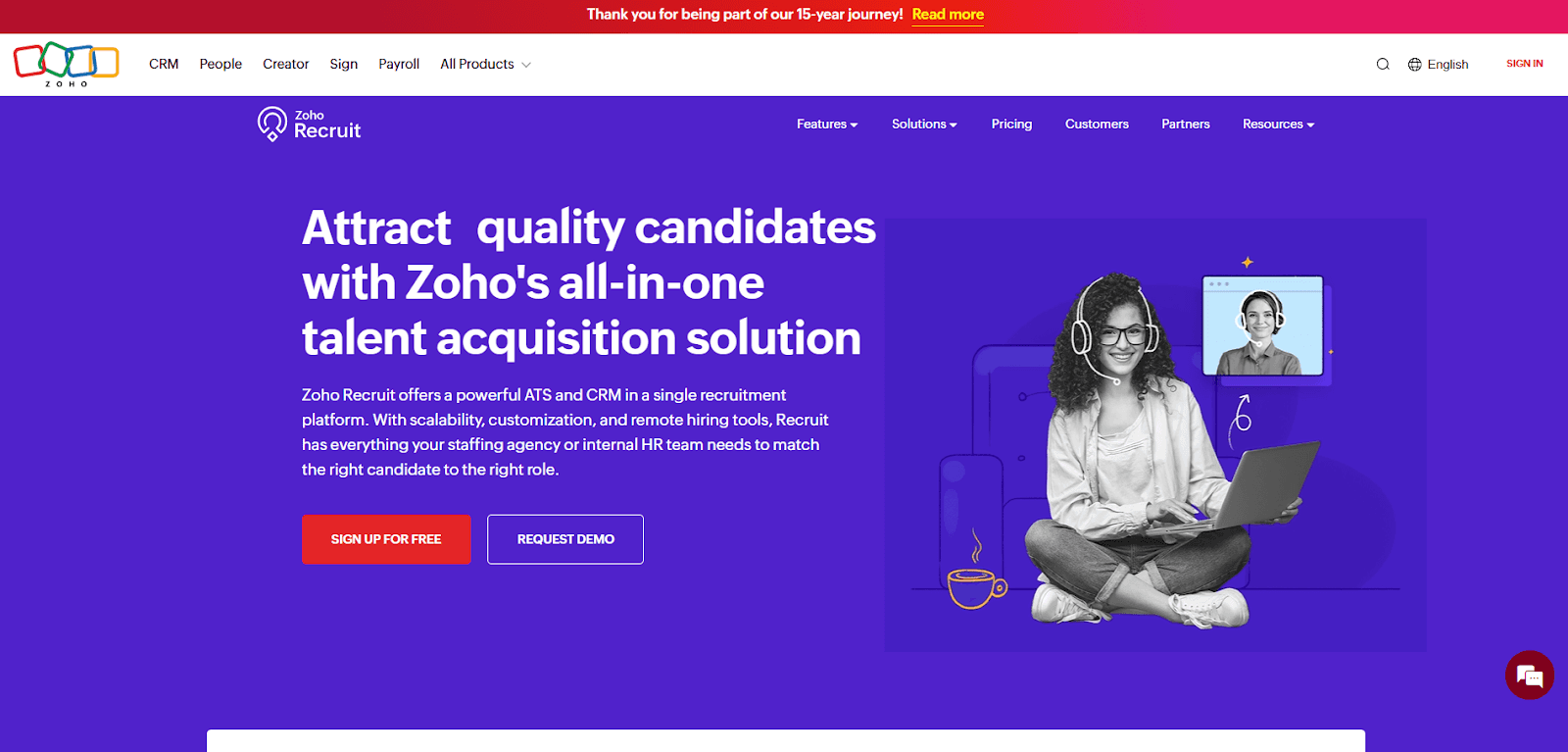
Zoho is a comprehensive business software suite that serves more than 80 million users worldwide. Zoho People, its HR-specific solution, is designed to streamline HR operations, making it an excellent choice for organizations seeking end-to-end business management. Its cloud-based platform ensures accessibility and scalability for businesses of all sizes, with a particular focus on automation and customization.
Core Functionalities and Features
Employee Management: Centralized records for storing detailed employee profiles, contracts, and compliance data.
Onboarding Workflows: Automated workflows to create personalized onboarding experiences for new hires.
Attendance and Timesheets: Integrates with biometric systems and GPS tracking for accurate attendance and shift management.
Performance Reviews: Supports multi-source feedback, self-appraisals, and customized review cycles.
Customizable Analytics: Dashboards and reports to track employee performance, absenteeism, and productivity trends.
Strengths
A broad suite of business tools integrates seamlessly with Zoho People.
Competitive pricing makes it accessible for startups and SMEs.
AI-driven automation to reduce repetitive HR tasks.
Weaknesses
The interface, though powerful, has a steep learning curve.
Advanced features might require additional training or IT support.
Zoho’s adaptability makes it suitable for businesses prioritizing extensive integration and scalability.
Freshworks
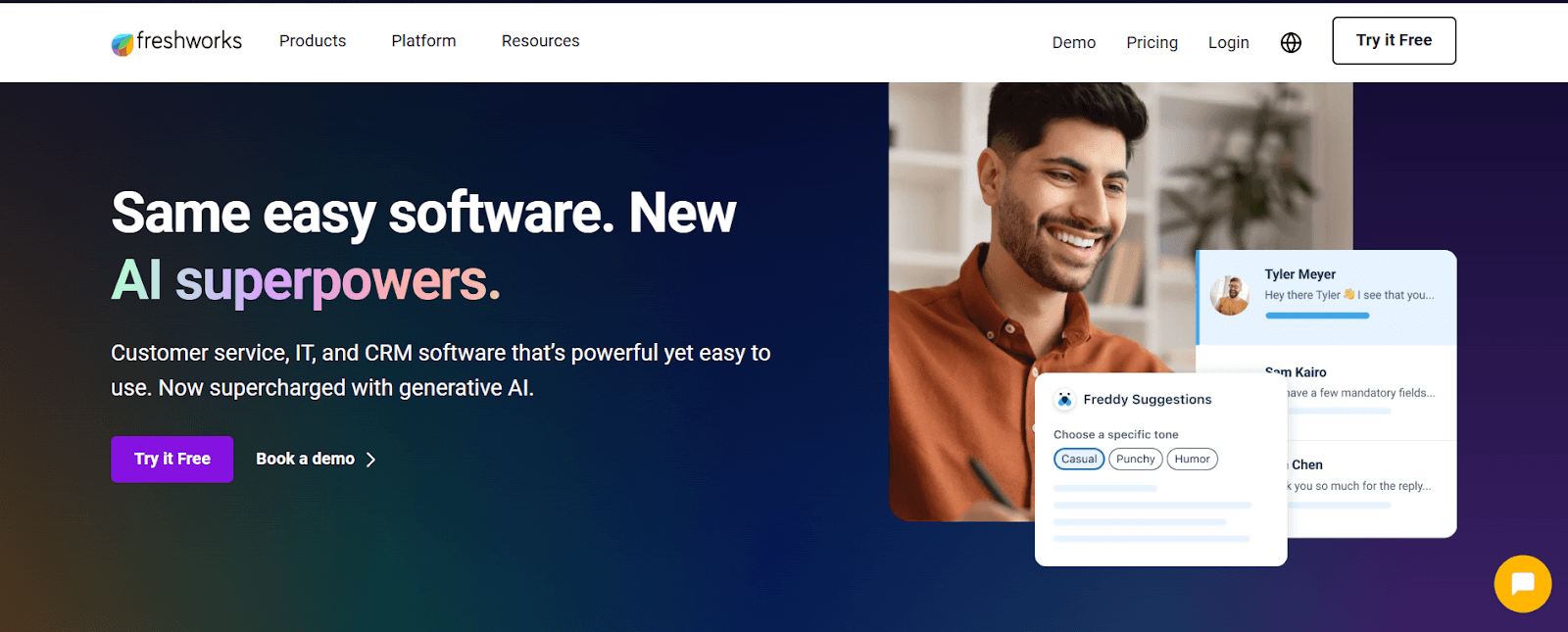
Freshworks is renowned for its user-friendly design and efficiency in managing customer and employee interactions. Freshteam, its HR CRM tool, is built with simplicity and functionality in mind, focusing on solving HR challenges for small and medium businesses. With its intuitive interface, Freshworks emphasizes ease of use and faster implementation.
Core Functionalities and Features
Recruitment Hub: Features like job postings, resume parsing, and candidate pipelines simplify hiring.
Leave and Attendance Management: Streamlined tracking of leave requests, approvals, and employee schedules.
Employee Directory: A searchable database for quick access to employee contact details and records.
HR Workflows: Automates manual HR tasks such as sending reminders for probation reviews.
Integrated Communication: Collaboration tools include email integrations, Slack compatibility, and in-app messaging.
Strengths
Exceptional user experience with minimal setup time.
Affordable solutions tailored for SMBs.
Excellent customer support with a proactive approach to issue resolution.
Weaknesses
Limited customization options compared to competitors like Zoho.
May lack scalability for larger organizations with complex requirements.
Freshworks excels in delivering straightforward solutions, making it an ideal fit for smaller teams looking for quick and efficient implementation.
Moving ahead, let’s see how Zoho and Freshworks stack up in terms of recruitment, performance management, and payroll capabilities.
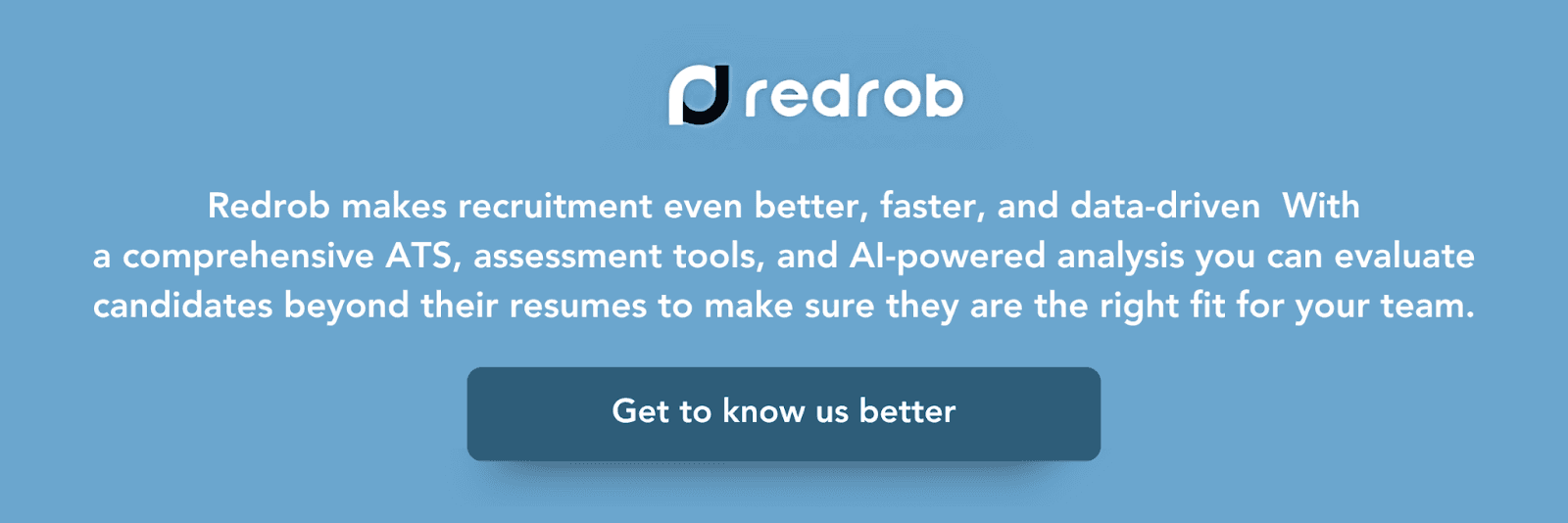
In-Depth Feature-by-Feature Comparison
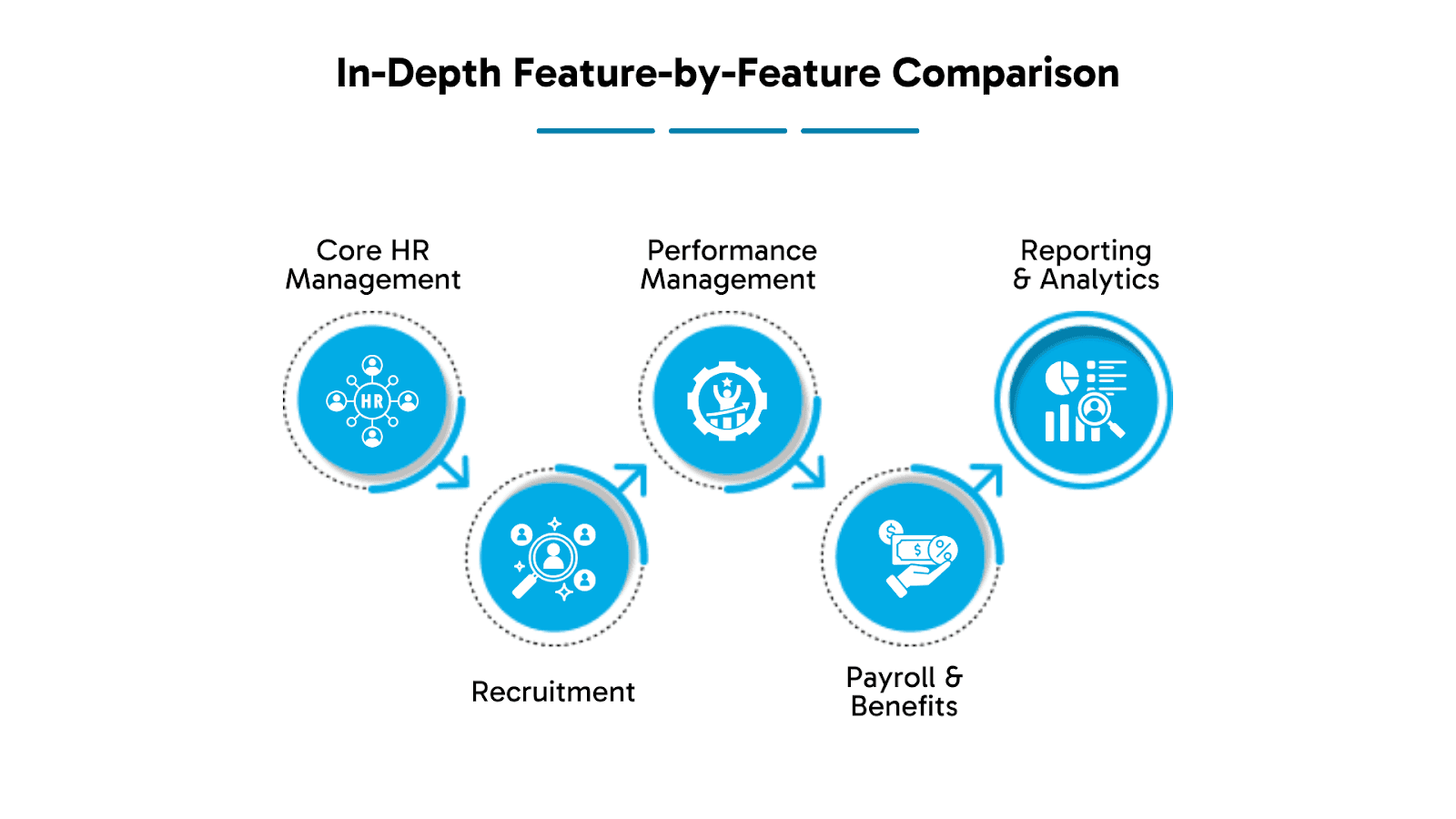
When deciding between Zoho and Freshworks, comparing their core functionalities helps identify the better fit. Here’s how they perform across key HR features.
1. Core HR Management
Employee Information Management: Zoho provides a centralized database for storing and organizing employee records. Its customizable fields make it adaptable to specific HR needs. Freshworks focuses on simplicity, offering an intuitive directory for quick access to essential employee data.
Onboarding and Offboarding: Zoho automates onboarding workflows, creating seamless experiences for new hires. Offboarding includes document management and exit interview tools. Freshworks simplifies onboarding with pre-built templates and email integration but offers limited offboarding features compared to Zoho.
Time and Attendance: Zoho integrates with biometric systems for accurate attendance tracking and shift management. Freshworks supports attendance tracking through integrations but lacks advanced options like GPS tracking, which Zoho provides.
Leave Management: Both platforms handle leave requests efficiently. Zoho offers detailed leave reports and balances tracking, while Freshworks excels in providing a simple, user-friendly leave application process.
2. Recruitment
Job Posting and Sourcing: Zoho enables job postings across multiple platforms, including integration with job boards. Freshworks offers similar features but targets small businesses with simpler processes and fewer integrations.
Candidate Tracking: Zoho delivers advanced applicant tracking with pipelines and detailed analytics. Freshworks emphasizes ease of use, offering straightforward candidate tracking with basic reporting tools.
Interview Scheduling: Zoho supports integration with calendars for interview coordination. Freshworks does this seamlessly, ensuring interviewers and candidates stay on the same page.
Onboarding: Zoho integrates recruitment and onboarding, reducing manual data entry for HR teams. Freshworks provides onboarding features but lacks Zoho’s depth in automation and personalization.
3. Performance Management
Goal Setting: Zoho allows detailed goal setting with progress tracking at individual, team, and organizational levels. Freshworks offers simpler goal-setting tools suitable for smaller teams.
Performance Reviews: Zoho supports multi-source reviews, including peer and manager feedback. Freshworks offers a lighter performance review system, focusing on direct feedback.
Feedback Mechanisms: Zoho’s 360-degree feedback tools enhance employee engagement. Freshworks offers basic feedback options but lacks the robust mechanisms found in Zoho.
4. Payroll and Benefits
Payroll Processing: Zoho provides built-in payroll features for accurate processing and compliance. Freshworks requires third-party integrations for payroll, making Zoho the stronger option here.
Benefits Administration: Zoho handles benefits administration with detailed tracking and customizable options. Freshworks focuses on offering simpler solutions, more suitable for small teams.
Tax Compliance: Zoho ensures compliance with local tax regulations, especially useful for businesses operating across regions. Freshworks lacks these built-in features, requiring external tools.
5. Reporting and Analytics
Customizable Reports: Zoho provides highly customizable reports tailored to HR metrics and KPIs. Freshworks offers fewer customization options but focuses on simplicity.
Real-Time Insights: Zoho’s analytics tools provide real-time updates on employee data and trends. Freshworks delivers insights but at a more basic level.
Data Visualization: Zoho excels in data visualization with dynamic dashboards. Freshworks provides static visuals, which may limit deeper insights.
This perspective of Zoho vs Freshworks shows clear strengths in different areas. Zoho leans toward detailed and scalable solutions, while Freshworks prioritizes simplicity and usability.
Up next, let’s evaluate their pricing and plans to help determine the best value for your business.
Pricing and Plans
Pricing often determines which HR CRM suits your business. Here’s a detailed comparison of Zoho vs Freshworks to help you decide.
Zoho’s Pricing
Zoho offers tiered pricing to accommodate businesses of different sizes and needs.
Free Plan: Designed for up to five employees, includes basic features like leave management.
Essential HR ($1 per employee/month): Covers attendance tracking, time logs, and centralized employee records.
Professional ($2 per employee/month): Adds features like performance appraisals and analytics tools.
Premium ($3 per employee/month): Includes advanced customization, third-party integrations, and employee self-service portals.
Enterprise ($5 per employee/month): Designed for large organizations needing full-scale automation and compliance tools.
Suitability for Businesses
Small startups can use the free or Essential HR plans.
Mid-sized businesses benefit from Professional or Premium plans with scalable features.
Large organizations find Enterprise best for handling complex HR needs.
Freshworks’ Pricing
Freshworks’ pricing structure is simple, targeting small to medium businesses.
Starter Plan ($59/month for up to 50 users): Includes applicant tracking, basic onboarding, and leave management.
Growth Plan ($99/month for up to 100 users): Adds advanced reporting, integrations, and custom workflows.
Pro Plan ($199/month for up to 250 users): Covers employee engagement tools, 360-degree feedback, and priority support.
Enterprise Plan (Custom Pricing): Tailored for larger businesses with specialized needs.
Suitability for Businesses
The Starter Plan works well for startups with limited HR requirements.
Small and medium businesses will find the Growth and Pro plans more comprehensive.
Enterprise Plan is ideal for larger teams needing custom solutions.
Comparing Zoho vs Freshworks, Zoho’s pricing is more granular and suited for varying scales. Freshworks appeals to SMBs looking for all-in-one pricing with predictable monthly costs.
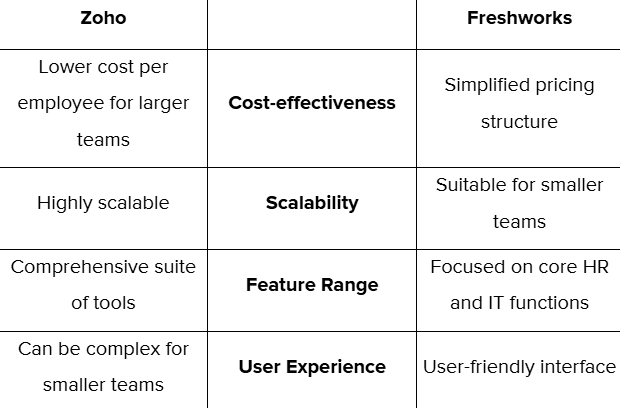
In the next section, we’ll analyze customization and integration capabilities to see how these platforms adapt to diverse business needs.
Customization and Integration
Customization and integration are key to aligning HR software with your business needs. Let’s explore how Zoho vs Freshworks compares in these areas.
Zoho Customization
Zoho excels in offering highly customizable solutions. You can tailor workflows, forms, and dashboards to match your business processes. Its drag-and-drop editor makes creating custom workflows simple. For example, you can set up automated approvals for leave requests or design unique appraisal forms for different roles.
Integration Capabilities with Other Tools
Zoho integrates seamlessly with over 50 Zoho apps, including Zoho Books, CRM, and Analytics. Additionally, it connects with popular third-party tools like Slack, Google Workspace, and Office 365. This ensures smooth data exchange across systems. For example, integrating Zoho People with Zoho Payroll automates salary processing based on attendance data.
Freshworks Customization
Freshworks offers moderate customization options, focusing on simplicity. You can adjust workflows, create custom fields, and modify templates. While it lacks the depth of Zoho, it prioritizes ease of use. For instance, you can set up automated notifications for recruitment stages or create tailored email templates for employee communication.
Integration Capabilities with Other Tools
Freshworks integrates with a range of popular business tools like Microsoft Teams, Slack, and QuickBooks. It also offers API support for custom integrations, but the options are less extensive compared to Zoho. Freshworks shines in integrating with recruitment platforms, streamlining hiring workflows from sourcing to onboarding.
Key Takeaways
Zoho provides deeper customization for businesses with complex needs.
Freshworks prioritizes usability, making it easier for smaller teams to manage.
Zoho offers broader integration capabilities, while Freshworks focuses on essential third-party tools.
Next, we’ll evaluate how these platforms fare in user experience and support, two critical aspects of ensuring seamless HR operations.
User Experience and Support
User experience and support are critical in evaluating HR software. Here’s how Zoho vs Freshworks perform in these areas.
User Interface and Usability
Zoho offers a feature-rich interface designed for flexibility. However, it may feel overwhelming for first-time users. Advanced options require some training but reward you with powerful tools. Freshworks takes a simpler approach, ensuring HR teams and employees can quickly adopt its features. Its minimalistic layout prioritizes accessibility over depth.
User Interface Design and Intuitiveness
Zoho’s interface focuses on functionality, with customizable dashboards that cater to specific HR tasks. Freshworks emphasizes a clean and straightforward design, making it easy for users to locate features without much effort. For example, Freshworks’ onboarding dashboard allows HR teams to manage multiple tasks seamlessly.
Quality of Customer Support
Zoho provides round-the-clock support through chat, email, and phone. It also offers dedicated account managers for Enterprise users. Freshworks matches this with 24/7 email and chat support, emphasizing quick issue resolution for paid plans. Both platforms aim to resolve issues promptly but differ in their escalation processes.
Response Times and Resolution Rates
Zoho maintains competitive response times, especially for higher-tier plans. Freshworks is known for swift responses in its premium plans, often resolving basic queries within minutes. For more complex issues, Zoho’s specialized support teams ensure better follow-up.
Availability of Online Resources and Forums
Zoho has an extensive knowledge base with guides, tutorials, and forums. Its active community helps users find answers to unique questions. Freshworks also provides a solid library of articles and FAQs. However, its community forums are less active compared to Zoho’s.
Key Takeaways
Zoho suits businesses needing extensive features and hands-on support for complex issues.
Freshworks appeals to smaller teams seeking simplicity and faster onboarding.
Both platforms deliver solid knowledge bases, but Zoho’s active forums add extra value.
Now let’s get some tips to help you make an informed choice.
Making the Right Choice: Factors to Consider
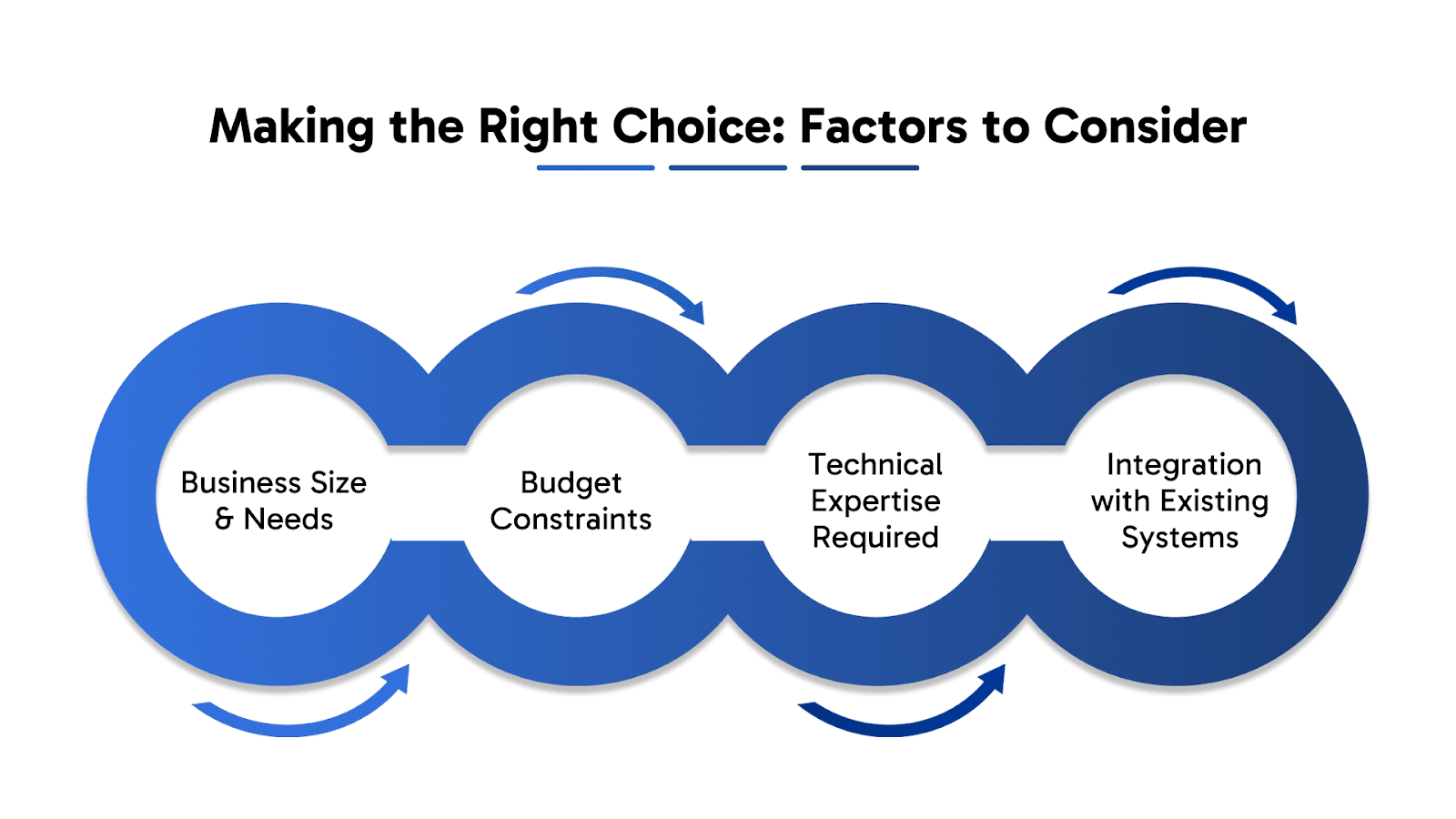
Choosing between Zoho vs Freshworks depends on your business needs, budget, and technical requirements. Here’s how to decide.
1. Business Size and Needs
To pick the best tool you should consider how well they suit your team’s size. Small businesses need simplicity, while large organizations prioritize scalability and advanced features.
Small Businesses
Freshworks is ideal for small businesses with straightforward HR requirements. Its ease of use ensures minimal learning curves. Basic features like onboarding and attendance tracking are well-suited for teams with limited HR expertise.
Medium-Sized Businesses
Zoho stands out for growing businesses. It offers customizable modules, making it adaptable to evolving needs. For instance, Zoho’s employee performance tools are more advanced, enabling detailed goal tracking and appraisals.
Large Enterprises
Zoho is the preferred choice for large enterprises. It supports complex workflows and integrations across multiple departments. Freshworks can handle enterprise needs but focuses more on simplicity than advanced functionality.
2. Budget Constraints
It’s important to balance cost-effectiveness with long-term value. Let’s compare how Zoho vs Freshworks fares in terms of pricing strategies.
Cost-Effectiveness of Each Platform
Freshworks provides cost-effective solutions for businesses with tight budgets. Its basic plans deliver essential HR tools at a competitive price. Zoho, while slightly pricier, offers better value for businesses needing advanced features and scalability.
Long-Term Investment vs. Short-Term Savings
Zoho’s flexibility makes it a better long-term investment. Customizable tools reduce the need for future upgrades. Freshworks appeals to those prioritizing short-term savings, especially startups focusing on immediate needs.
3. Technical Expertise Required
Zoho demands a moderate level of technical expertise, especially for setup and customization. Teams with IT support will find Zoho’s advanced tools rewarding. Freshworks, on the other hand, caters to users with limited technical skills, offering a plug-and-play experience.
4. Integration with Existing Systems
Zoho’s wide integration capabilities work well for businesses using multiple tools, like Zoho Analytics or third-party apps. Freshworks offers simpler integrations, making it a practical choice for teams looking for essential connections without extra effort.
What’s the Best?
Freshworks suits small teams seeking affordability and simplicity.
Zoho supports scalability, advanced features, and long-term growth for larger enterprises.
Your choice depends on balancing immediate needs and future growth opportunities.
Make a Confident Choice
Selecting the right HR platform is crucial for streamlining operations and meeting your goals. Between Zoho vs Freshworks, your decision should align with your business size, budget, and technical capacity.
Zoho caters to enterprises seeking customization and scalability, while Freshworks provides ease of use and cost-efficiency for smaller teams.
At Redrob, we specialize in helping businesses like yours choose the best HR solutions. Whether you need advanced tools for performance management or simple onboarding features, we guide you every step of the way.
Take the next step now.
Explore Zoho and Freshworks to see how they meet your needs, or reach out to Redrob for expert advice. Hire faster and better while also saving costs. Get Your FREE Trial Today!
